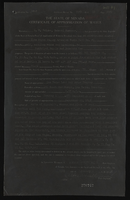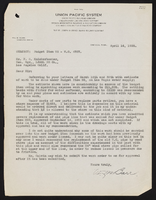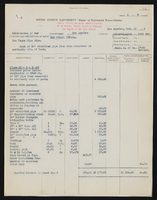Search the Special Collections and Archives Portal
Search Results

Telegram from N. A. Williams (Los Angeles) to Walter R. Bracken (Las Vegas), June 5, 1924
Date
Archival Collection
Description
The water shortage was causing concern for the railroad because low water levels caused the well to spew sand which was very bad for the trains. A new well was needed to increase supply of water.
Text
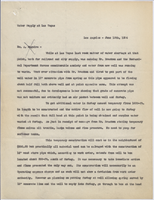
Letter from W. D. Johnston (Los Angeles) to A. Maguire, regarding water supply at Las Vegas, June 12, 1924
Date
Archival Collection
Description
Details some of the struggles the Las Vegas Land and Water Co. was having in an attempt to increase production in the midst of a water shortage.
Text
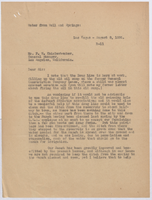
Letter from Walter R. Bracken (Las Vegas) to F. H. Knickerbocker (Los Angeles), regarding water from well and springs, August 8, 1934.
Date
Archival Collection
Description
Walter Bracken asking for permission to fill in the swimming pool and use the company drag line to clean out the ditch to the Las Vegas Ranch so overflow could be used by the lesee rather than go to waste.
Text

Letter from Walter R. Bracken (Las Vegas) to R. L. Adamson (Los Angeles), March 11, 1935
Date
Archival Collection
Description
Bracken calling on the Assistant Chief Engineer to do something about the leaking
Text

Letter from Walter R. Bracken (Las Vegas) to F. R. McNamee (Los Angeles), August 14, 1913
Date
Archival Collection
Description
Bracken wrote to the company lawyer to find a permanent solution to a yearly problem of gate vandalism at the Stewart burial plot.
Text


